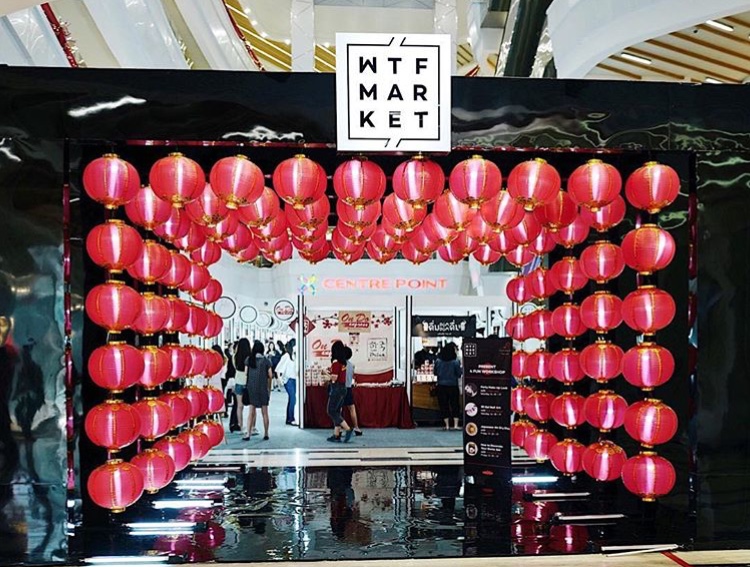How to maintain WTF Market hype
The business of pop-up market - Part 2 of 2
Running pop-up market is no rocket science. For starter, the workflow usually goes by setting the dates, booking the venue, approaching tenants, hiring crews and contractors and last but not least, marketing the event.
The props are roughly the same every year. Event organiser provides a booth separator, two chairs and a table. The tenants have to decorate the empty space themselves. The liability is lower for the organiser compared to that of the tenants.
As a result, pop-up market or bazaar becomes very common. When the same thing appears over and over again, the demand spreads out and there is uncertainty whether the next event will be as successful as the previous one. In order to stand out among other pop-up events, organisers have to specify their target audience and create solid branding that caters to the audience.
WTF Market wants people to know that this is not just another pop-up event. They brand themselves as a creative event made by and for the youngsters. “The ones who can build hype of the event and our name are the youngsters and the fastest way to attract them is by creating branding that caters to theme,” said WTF Market founder Cindy Owada. “Youngsters nowadays look at the branding, the design.”
With a branding that embodies the energy and the hype surrounding the youth culture, people would be automatically attracted to attend. “We want to look cool and to be seen as cool by them [the youngsters] so that they would share and post it to their Instagram and to promote it even further and attract more people.” she explained.
Cindy and her team also curate the tenants and activities to make sure they don’t repeat the same products and guests every year – although there are regular tenants that participate in every WTF Market event.
“We always have to be on the edge of what’s currently trending. It can never be the same theme every year. If WTF (We the Fest) invites Billie Eilish every year, the crowd will probably get bored by 2020 and stop coming.”
WTF Market in Manado, North Sulawesi
Take, for instance, WTF Market’s last year event in Jakarta. Utilising the significant rise of upcoming beauty brands and the hype of the beauty industry, WTF Market joined hands with beauty influencers Cindercella, Titan Tyra and Amelia Bunjamin to sell their pre-loved make-up at discounted price. There were long lines before the booth was opened. The pre-loved make-up sold out within 3 days on a 4-day event. In total, they managed to sell around 1,500 pre-loved make-up items.
WTF Market has effectively rode the wave of the beauty industry hype and tailored the event surrounding that trend. “What builds the hype is the trend of that year and how we can develop and integrate it into our event.”
On top of branding, curation and activity, one of the values WTF Market offers is logistics service. “Since we have events in other cities, we take care of the brands’ inventory shipment from Jakarta. It is included in the price they pay for the booth.”
WTF Market in Medan, North Sumatra
WTF Market currently holds annual event in Medan, Manado, Makassar and Jakarta. The expansion is crucial in maintaining their hype and success. “There are many pop-up markets in Jakarta. Expanding to other cities helps keep WTF alive.”
WTF Market events in other cities are set on specific dates in order to catch up with seasonal momentum. In Medan, for example, WTF Market holds the event in January, right before Chinese New Year because Chinese Indonesians make up a large proportion of the population in Medan, North Sumatra.
In Manado, WTF Market usually holds the pop-up in November, when Christmas is just around the corner. In Makassar, the pop-up market sets foot in May or June, close to Ramadan.
The strategy works like a charm. Jakarta residents are spoiled with choices with easy access to local or global brands, from affordable to luxury. On the other hand, Indonesians living in other cities don’t have that kind of access. Events like pop-up market that bring Jakarta-based brands to their cities allow them to experience similar privilege to Jakarta residents.
According to Cindy, almost every brand that joins WTF Market in other cities recorded hundreds of millions of rupiahs in sales. There is a brand that posted Rp250,000,000 revenue within 5 days of pop-up in Medan. The brand ends up opening a store in the city.
“I started WTF Market because I see a business potential. I didn’t have the kind of idealism like pushing local brands forward,” said Cindy. However, as WTF Market progressed, local brands become the centre of the event and vice versa. Events like WTF Market is necessary to support small players in the creative economy.
The workflow of pop-up market might not be complicated, but keeping it alive is an endless work.




